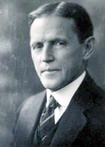CHAPTER XIX
Eye Strength Through Sunlight
Here is presented a most remarkable discovery to the effect that the rays of the sun have not only a beneficial, but a curative effect upon the eyes. The physician who conducted these researches, and who affirms the validity of these statements, does not attempt to explain this benignant influence of the sunlight, but fact is attested by numerous proofs.
The author, however, suggests caution in attempting any home treatment of this kind. The policy of "safety first" has come to be a recognized principle of modern life, and it would undoubtedly be wise to experiment carefully with radical measures of this sort. Any one can experiment with sun-gazing in the early morning or late afternoon, but caution is suggested in attempting to outstare the noonday sun in June. The burning glass should never be used by inexperienced persons.
WHILE it is recognized in a general way that light is good for the eyes, most people entertain a fear of what they call "strong light." For this reason, as well as because the light often causes them actual discomfort, people protect their eyes from the sunlight with smoked or amber glasses and broad-brimmed hats and parasols, while persons working under artificial light use eye-shades and similar devices. All this is, to a large extent, superstition.
The eyes need no protection either from the light of the sun or from any other light. No artificial light can equal the rays of the sun in intensity, and the sunlight, far from being harmful, is the best thing in the world for the eyes. The eyes were made to react to the light, and in its absence they deteriorate and become weak. Fishes which live in sunless caves become blind; miners and people living in dark tenements develop all sort of eye troubles. Their eyes become increasingly sensitive to the light-rays until after a time they cannot look at strong light at all without pain. Then they are advised not to do so, but to rest the eyes by remaining in a dark room until they have recovered! As a matter of fact, the eyes are weak just because they have lacked the benefit of the sun's rays; and what they need more than anything else, in order to get well, is the thing of which they have been deprived. Sunlight is one of the best curative agents we can employ for the eye. Persons with weak and defective eyes should look in the direction of the sun every day, until they are able to look straight at it without pain or injury.

Persons with normal sight can look directly at the sun without injury or discomfort. Note that the eyes are wide open, with no evidence of pain and no watering.
Not only is it beneficial to look at the sun, but in most diseases of the eyes the sun's rays concentrated upon them by means of a burning glass exert a remarkably curative effect. The following are examples of hundreds of similar cases that might be cited:

Demonstrating again that the normal eye can regard the orb of day without injury. With the sun shining almost directly into her eye, the subject reads the Snellen test card with normal vision.
A man suffering from inflammation of the eyelids was unable to attend to his work, because, as soon as he left the house and went into the sunlight the discomfort he experienced was so great that he could not keep his eyes open, and had to return home. He had been in this condition for more than fifteen years, and had received all kinds of treatment from many physicians. After a few treatments with the burning glass he was able to return to his work without further trouble.

Concentrating the rays of the sun upon the eyeball with a lens or "burning glass," demonstrated to be an effective curative measure in conjunctivitis, iritis, ulcers of the cornea and other diseases of the eyes.
Another man suffering from trachoma was unable to open his eyes in the sunlight and therefore had great difficulty in finding his way about. One treatment enabled him to open his eyes and go into the sunlight without discomfort.
These cases are interesting, not only in themselves, but because they strikingly illustrate the baselessness of the present fear of strong light.
